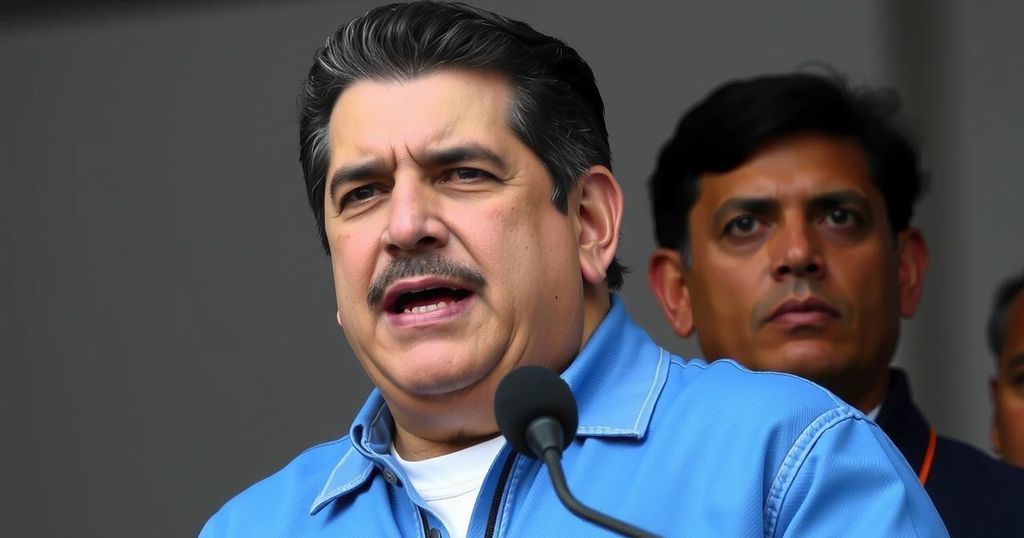Nicolás Maduro is set to begin his third term as President of Venezuela on January 10, despite allegations of electoral fraud from the July 28 election. Widespread skepticism surrounds his victory claim, as many believe opposition candidate Edmundo González was the true winner. The ongoing crackdown on dissenters complicates public protests against Maduro, while international diplomatic perspectives on Venezuela’s future remain highly debated.
Venezuelan President Nicolás Maduro is preparing to commence his third six-year term as of January 10, amidst significant doubts regarding the legitimacy of the July 28 election that affirmed his position. The ruling party-controlled congress is expected to oversee the swearing-in ceremony despite numerous allegations of electoral fraud. Critics, both domestic and international, have raised serious reservations about the integrity of the election process, with Edmundo González, the opposition candidate, widely acknowledged as the true victor. Reports from the U.S.-based Carter Center support claims that the opposition’s tally sheets are credible, further undermining Maduro’s claim of victory by over a million votes.
The inauguration will solidify Maduro’s control over a nation beset with rampant inflation, food shortages, and systemic cronyism, enduring more than 11 years of his leadership. In response to Maduro’s upcoming swearing-in, opposition leaders have called for mass protests. However, a recent government-sponsored crackdown has led to the detainment of over 2,000 individuals, instilling fear that may suppress public dissent. The prominent opposition figure María Corina Machado, who has remained largely in hiding, is expected to re-emerge in efforts to mobilize resistance against Maduro.
Edmundo González, acknowledged as Venezuela’s president-elect by some international entities, fled to Spain following an arrest warrant issued for him. He has since resurfaced and is actively engaging with global leaders to reinforce support for the opposition. González recently met with President Biden in what he described as a productive exchange. This meeting transpired shortly after Venezuelan authorities announced a substantial reward for González’s capture, reflecting the regime’s continuing persecution of dissenters.
As Nicolás Maduro’s regime coincides with a potential second term for President Trump, there are speculations regarding the new administration’s strategy towards Venezuela. During his prior presidency, Trump was a staunch critic of Maduro, and tensions between the two have historically run high. Nevertheless, Maduro has extended overtures to Trump, suggesting a desire for a more conciliatory relationship. Former diplomat Isaias Medina III cautioned that any negotiations should ultimately focus on the liberation of Venezuela, emphasizing the existential threats posed by elements such as the Tren de Aragua, a criminal organization linked to Maduro’s government.
Analysts are divided on whether the Trump administration will reinstate stringent sanctions against Maduro. The Biden administration’s public stance, coupled with significant Venezuelan emigration in recent years, suggests potential changes in strategy. Representative Mike Waltz and Senator Marco Rubio, prominent figures in the incoming administration, are both advocates for a robust opposition to Maduro’s regime. Meanwhile, over the recent months, the Venezuelan government has detained foreign nationals, potentially as leverage against U.S. policy initiatives regarding the Maduro regime.
The political climate in Venezuela has been tumultuous since Nicolás Maduro assumed the presidency. His governance has been characterized by increasing authoritarianism, resulting in economic disarray and widespread humanitarian crises. The most recent election raised alarms both within Venezuela and internationally, with numerous allegations claiming that the electoral process was manipulated to ensure Maduro’s continued grip on power. Opposition figures have faced significant repression under his regime, complicating efforts to challenge his authority. International observers, including the Carter Center, have drawn attention to the discrepancies in the electoral process, supporting the emergence of an alternative leadership in Edmundo González.
In conclusion, Nicolás Maduro’s impending inauguration for a third term presents a stark picture of the current political landscape in Venezuela, characterized by widespread skepticism surrounding the integrity of the election that cemented his position. The arrest of opposition leaders and heightened tensions within the country underscore the urgent need for international attention and response. The possibility of new diplomatic approaches from the incoming U.S. administration, amidst Maduro’s overtures, remains uncertain, yet crucial as the Venezuelan populace continues to endure the consequences of a repressive regime.
Original Source: www.foxnews.com






